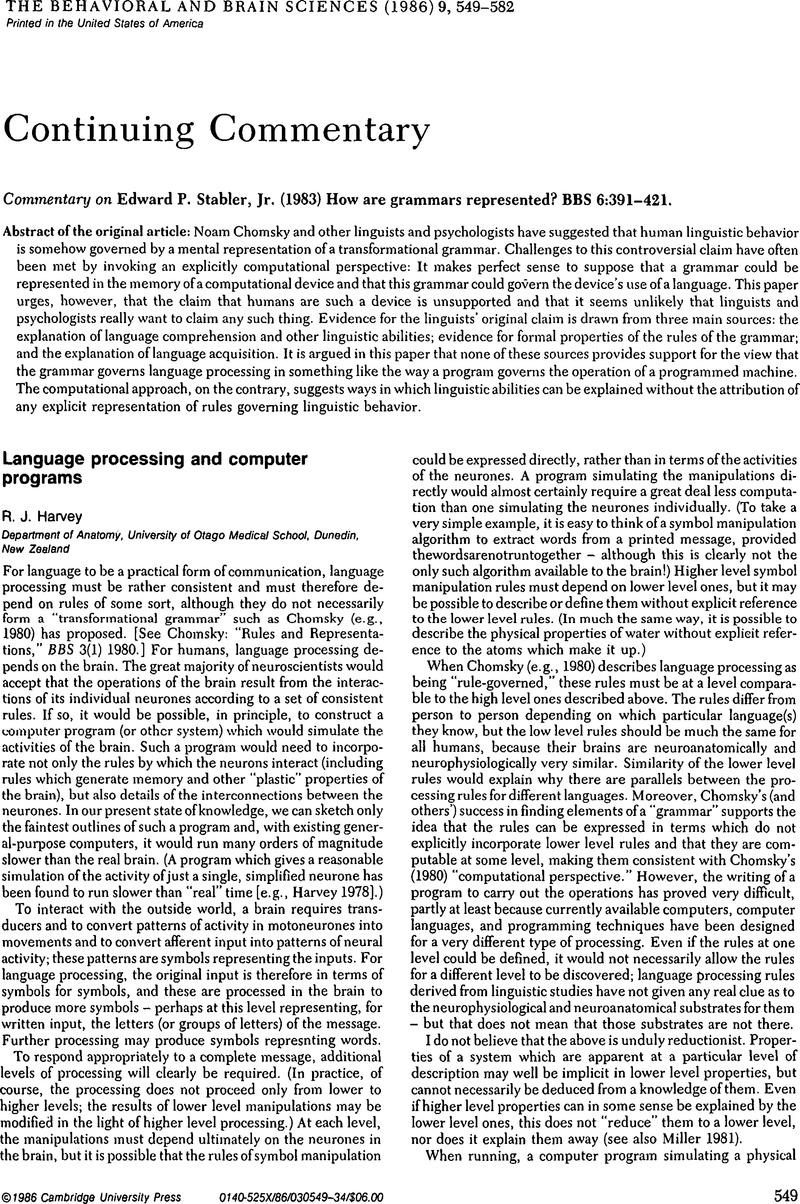No CrossRef data available.
Article contents
Toward a synthetic approach to intelligence
Published online by Cambridge University Press: 04 February 2010
Abstract
An abstract is not available for this content so a preview has been provided. Please use the Get access link above for information on how to access this content.

- Type
- Continuing Commentary
- Information
- Copyright
- Copyright © Cambridge University Press 1986
References
Berry, J. W. (1984) Towards a universal psychology of cognitive competence. In: Changing conceptions of intelligence and intellectual functioning, ed. Fry, P. S.. North-Holland. [rRJS]Google Scholar
Biela, A. (1981) Psychologiczne podstawy wnioskowania przez analogie. Panstwowe Wydawnictwo Naukowe. [AB]Google Scholar
Biela, A., Chlewinski, Z. & Walesa, C. (1983) Developmental aspects of decision making. In: Human decision making, ed. Sjöberg, L., Tyszka, T., & Wise, J. A.. Bokförlaget Doxa AB. [AB]Google Scholar
Binet, A. & Simon, T. (1905) Méthodes nouvelles pour le diagnostic du niveau intellectual des anormaux. Année Psychologique 11:191–244. [AB]CrossRefGoogle Scholar
Bruner, J. S., Goodnow, J. J. & Austin, G. A. (1956) A study of thinking. Wiley. [rRJS]Google Scholar
Colwell, R. K. (1974) Predictability, constancy, and contingency of periodic phenomena. Ecology 55:1148–53. [KR]CrossRefGoogle Scholar
Edelman, G. M. (1978) Group selection and phasic reentrant signalling: A theory of higher brain function. In: The mindful brain: Cortical organisation and the group selective theory of higher brain functions, ed. Edelman, G. M. & Mountcastle, V. B.. MIT Press. [KR]Google Scholar
Holloway, R. L. (1975) The role of human social behavior in the evolution of the brain. The American Museum of Natural History. [KR]Google Scholar
Kohlberg, L. (1969) Stages and sequence: The cognitive-developmental approach to socialization. In: Handbook of socialization theory and research, ed. Golsin, D.. Rand-McNally. [AB]Google Scholar
Konorski, J. (1967) Integrative activity of the brain. University of Chicago Press. [AB]Google Scholar
Medin, D. L. & Smith, E. E. (1984) Concepts and concept formation. Annual Review of Psychology 35:113–38. [ KR]CrossRefGoogle ScholarPubMed
Plotkin, H. C. & Odling-Smee, F. J. (1979) Learning, change and evolution: An enquiry into the teleonomy of behavior. Advances in the Study of Behavior 10:1–42. [KR]CrossRefGoogle Scholar
Schmidt, R. A. (1975) A schema theory of discrete motor skill learning. Psychological Review 82:225–60. [KR]CrossRefGoogle Scholar
Smith, E. E. & Medin, D. L. (1981) Categories and concepts. Harvard University Press. [KR]CrossRefGoogle Scholar
Spitz, H. H. (1978) The universal nature of human intelligence: Evidence from games. Intelligence 2:371–79. [HHS]CrossRefGoogle Scholar
Stern, W. (1920) Die Intelligenz der Kinder und Jugendlichen und die Methoden ihrer Untersuchung. J. A. Barth. [AB]Google Scholar
Sternberg, R. J. (1977) Intelligence, information processing, and analogical reasoning: The componential analysis of human abilities. Erlbaum Associates. [rRJS]Google Scholar
Sternberg, R. J. ed. (1982) Handbook of human intelligence. Cambridge University Press. [rRJS]Google Scholar
Sternberg, R. J. ed. (1984a) Human abilities: An information-processing approach. W. H. Freeman. [rRJS]Google Scholar
Sternberg, R. J. (1984b) Toward a triarchic theory of human intelligence. Behavioral and Brain Sciences 7:269–315. [rRJS, AB, KR, HHS]CrossRefGoogle Scholar
Sternberg, R. J. (1985) Beyond IQ: A triarchic theory of human intelligence. Cambridge University Press. [rRJS]Google Scholar
Szuman, S. (1931) O aktach i ezynnościach myślenia i ich stosunku do inteligencji. Kwartalnik Filozoficzny 9:1–39. [AB]Google Scholar
Washburn, L. S. & Avis, V. (1958) Evolution of human behavior. In: Behavior and evolution, ed. Roe, A. & Simpson, G. G.. Yale University Press. [KR]Google Scholar
Whitehead, A. N. (1932) Science and the modern world. Cambridge University Press. [KR]Google Scholar


